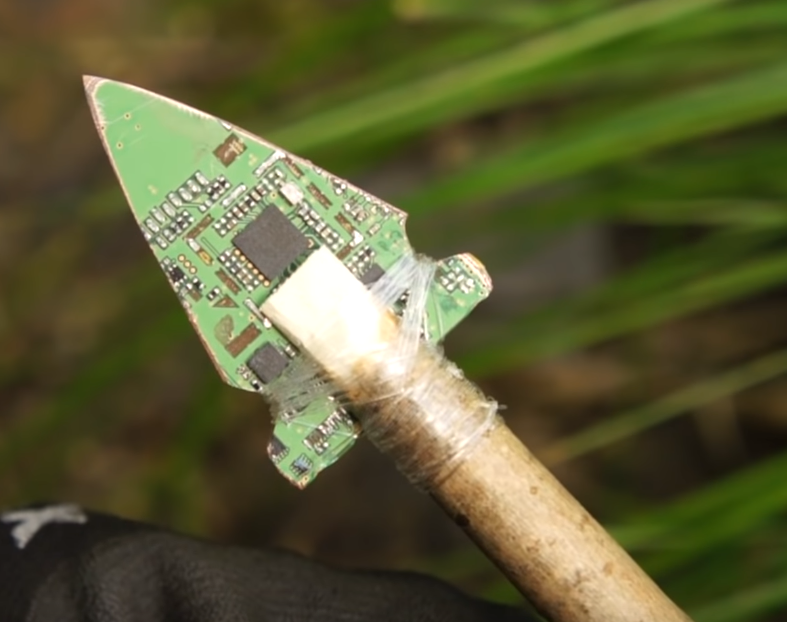I was right in the edge of Gen Z and Millennial and grew up being the family’s tech kid. It still astounds me now that my younger sisters don’t know how to even look for solutions. They just get me. Having moved out I get texts and calls sometimes. I’ve had to explain that using a computer is a skill that is learnable. I didn’t learn by going to someone else. I had to learn how to learn. That’s the skill we should be teaching kids. Not how to solve the problems, but how to FIND the solution to problems.
As someone also near the border between Gen Z and Millennial, I relate a lot to this comment. I was also the family tech kid, and since like middle school I’ve always told people “I’m not good with computers, I just know how to use a search engine”
My “computer literacy” is literally just basic research skills; knowing how to formulate a web search and how to identify bad sources.
Right! This is why I say it has more to do with being stubborn than being smart. If you’re determined to find a solution and you’re half decent at research and following instructions, you can figure a lot out, but people treat it like you invented the thing with some magical knowledge that they could never possess.
You’ve just articulated a feeling I’ve had most of my life, but couldn’t have described better.
Solving trivial problems for people they could easily do themselves if they just muddled through the work of it. Then act like I’m a genius, when it’s really just ‘stubbornness’ and refusing to admit i can’t figure it out.
Thanks for that.
On this subject, my personal definition for millennial is someone in the age bracket where they had to teach themselves how to use windows as a kid
But if you are good at using search engine, you are good with computers
It’s the issue that is the most baffling to me. Learning how to search properly can be done in 10 minutes but no one does it.
If I want a recipe for a burger with onions, I’ll search for “recipe burger with onions.” When people around me search for the same recipe, they would type “I’m hungry and I’d like stuff with onions and shit” and instead of getting one of the billion web sites with recipes, they would stumble upon a weird blog about an anorexic girl who is obsessed with onions, and think that the internet contain no recipes at all.
I think we can blame the education system. At some point it became solely about passing some arbitrary threshold of students with high exam scores rather than about teaching students how to get by in life.
End result was an education system that simply teaches kids how to pass exams rather than basic life skills like critical thinking.
I also blame the education system, the fact that my computer teacher thought that opening R, trying to reconnect to WiFi, and opening the cmd prompt were all attempts at “hacking” is sad. The fact our robotics class shut down when the exchange student left, because he was the only who knew how to program was sadder.
Part of the problem is the people making the standards don’t even know how ignorant they are themselves. Like I at least recognize I have a lot learning to go, and lean heavily on people more experienced than me in fields I’m not the expert.
The late 90s Gen Z/Millennial DMZ is a painful place to exist. Constant and mandatory tech support.
The ones that is blamed for the ills of society by both the baby boomers and younger gen zs
Yep. I was born 1998. To Millennials, I’m a tiny baby Gen Z, to Gen Zs, I may as well be a boomer. It’s odd.
Growing up poor confuses things even more, because I have more in common with people born late 80s/early 90s than with people born only a few years after me. My first game console was a SNES and we had a VCR until we got a PS2, and kept using it well after.
Growing up poor confuses things even more
Yeah this is why generations aren’t actually a good metric. I might as well be from another planet lol
Hah, are we the same person? My family was poor too. I’m a bit younger (born 2000) but I grew up using a VCR, and my first console was a GBA where I played a lot of SNES ports. The internet has existed my entire life, but I still remember before smartphones were a thing. It’s a really weird place to be socially. I don’t connect with Gen Z culture in almost any way, but I’m also distinctly not a millennial.
Interestingly my older sister (1998) who has zero interest in anything tech is actually pretty tech savvy for how little she cares about it. I think she crossed that threshold of learning how to learn, where even when she comes across something she doesn’t understand she knows how to approach the problem.
95 here. Started with the original GameBoy and an old Macintosh in the basement. My first computer was a POS gateway with the cow logo and 128MB of RAM. Finished up high school with the Xbox 360 and an iPhone. I’m a retrogrouch to Gen Z and some kind of hacker to most Millenials. My GF (same age) and I jokingly call ourselves “MillenialZ” (with an obnoxious accentuated zzzzzz at the end) because we don’t quite fit in with either generation.
I love it. I think that should be the official title for our mini generation.
Same boat here, though a couple years later. It feels really weird to be so out of the loop with my “fellow” Gen Z siblings who were born in the late 00s.
I’m also between gen Z and millennial and was the family’s tech kid and still get calls. Are you me? :D
Just yesterday I got a call asking how to select all images in a directory… And then another call about how to get those images to Google Drive, which is literally just drag and drop… And one of the people involved was my gen Z younger sister.
the family’s tech kid and still get calls
I don’t know how you all get calls. I have literally never been called to fix a computer. People prefer to pay some random guy at Walmart who will scam them, instead of calling me and getting free help. And I’m not a troll, not an asshole, or an incel, I’m a regular guy, I’m friendly, but people don’t seem to care, they prefer paying for useless help.
Of course my family members call me. It’s the only way they get the tech support I used to offer in-house. :D
Teach a child to fish, basically.
If we keep making it easy for them… Ask and I’ll give you all the answers… They’ll never learn.
My first response these days is, “What have you tried so far?” And, “What are you searching for in ‘Google’?”
I also ask “what have you tried so far” mostly because too many times I get into troubleshooting and then discover that they’ve created a new problem while doing their own troubleshooting. (Like one time they plugged in a second cable between two switches - good god was that hard to troubleshoot remotely)
I’m going to go against the grain a bit here - while there were some nuggets of truth, there was also a lot of insufferable behavior from someone who’s job it was to teach technology to people who don’t know technology. This person recounted so many great teaching moments in such a dismissive way, it just made me sad.
I absolutely get how frustrating it can be to work in customer-facing technical roles, and to get dismissed for it. But if one of my customers was smart enough to embed a YouTube video in a PowerPoint slide, they’re smart enough to understand when I say “it looks like PowerPoint is trying to load it from YouTube every time you hit play, but YouTube is blocked on our network. Let’s think through some other options”. Not only that, it’s critical information the next time they want to present a video, and it’s information they can share with others around them too.
Every one learns something for the first time. Expert to noob all start in the same state of knowing nothing.
I’m going to go a bit further and say that kids today are not worse than in the past. It’s been 20 years since I taught computers but the doom and gloom here could have easily been posted in 2002 with only minor rewording.
GUIs got good with the launch of the Mac in 1984, and by the launch of XP & Mac OS X in ‘01 good GUIs were cheap. This brought computers into way more homes and exposed them both to kids who liked them for their own sake and to kids who saw them primarily as a tool.
I think people like this handwringing about kids not understanding computers on a deep enough level for their taste are just being obtuse.
I write software now instead of teaching and I write the kind of software that people should be able to just use as a tool.
We’ve had 20 years where the vast majority of computer users understand latin better than they understand their computers. It’s fine. It’ll continue to be fine.
Man, I didn’t realize that article was written in 2013, it could’ve been written today, and it still would’ve been true. I think one of the biggest contributions to the tech illiteracy of people is, 1. Schools don’t really teach you about that kind of stuff (in my experience, or unless you take a special course) and 2. Everything is basically done for you now, its incredibly easy to do anything basic on computers.
So when the author says it’s the 30-50 year olds that know how to use computers, today it’s the 40-60 year olds. I’d say it goes older than that.
One thing that used to bug me on reddit was youngsters going on about how over-50s wouldn’t know how to use a computer. That hasn’t been the case for decades now.
It’s actually the 8-80 year olds that don’t know how to use computers.
Most people don’t know. They just know how to use a handful of programs. But the vast majority of them don’t understand the basic concepts behind them. Things like files and directories are nebulous at best.
Does it matter? A little, because so much stuff revolves around computers nowadays. Which means that they don’t really understand the world they’re navigating daily. OTOH, they live perfectly well as they are, so it clearly doesn’t matter to them.
It’s like understanding how a car works. Some people know what every sound is. Some people can’t even grasp what oil is.
We’re going to end up like that society in Star Trek that worships a computer.
But… The Computer is our friend!
Hear hear! We 40-50+ year old geeks were learning the Internet as it rolled out. Before that we were upgrading our PCs and modems as funds permitted, joining & running BBS’s on DOS. OS/2 seemed futuristic and I ran it for a while, but Linux won my heart. As a teenager, I had my favourite kernel hackers, tested their patches, chatted with them on IRC. Before that, we had our C64s, Amiga 500s and similar. We had the greatest opportunity to learn, and we loved it.
Over the last 10 years I’ve really had to dumb down my interview questions, covering a wider range of topics until I (hopefully) find a spark of passion and beyond-user-level knowledge about anything (even unrelated to the position)… it used to be easier.
I feel like getting into opensource software is easier than it ever was at least, the biggest Barrie’s I see are people thinking they can’t and advertising making people defensive about sticking to proprietary options.
Teaching direct tech through schools is problematic too because by the time they update the cirriculum the reality had changed. Concepts and diagnositcs would be a lot more useful, then let the kids have the tools to find the issues from there
I still remember getting in trouble at my public school with the IT admin because my friends and I discovered how to write BAT files, and had the brilliant idea to create a bunch of fork bombs that self-replicated until they froze their host computer.
Unfortunately I think kids today don’t even get enough leeway to figure that sort of shit out. But kids are awfully good at finding cracks in systems, so maybe they’ve just figured out how to get up to similar hijinks with GUIs and cloud storage.
I was showing an intern how to install a software the intern needed. The computer setup was a laptop with two external monitors. After we installed the software from one of the external monitors, the intern asked “so will this install the software in the other screen?” I was flabbergasted.
I mean… Technically it would.
Maybe he thought it was an all in one device.
I’m pushing 50 and when people ask me how I know so much about computers, my first comment is that I had to program my first computer for it to do anything.
My second is that I actively sought to learn, and you can too.
Later in life Linux played a huge role in understanding how these contraptions work. Ironically, I’m a human factors engineer, so I’m also guilty of creating part of the problem. User interfaces that “just work”… Until they don’t.
I had to program my first computer for it to do anything.
Sadly, most people have no grasp what that even means. I’ve had adults think that means I “downloaded something into the computer” and then it worked.
It was around that time I just stopped talking to anyone outside of my geek circle about anything technical. Best to play dumb.
Yeah, I realized I started to sound snarky when I said “I work on computers” when people ask me what I do. Didn’t mean it to sound dumb, it was just honestly the level of understanding about computers a lot strangers had when they asked.
Saying I did networking or worked with servers didn’t mean much, but sometimes people would ask me to work on their WiFi…
I am 28 and i have always thought that the as long as you know how to operate a search engine you can find out what you need. The reason computer people know computers better than you do is because computer people can use a search engine better than you
Good thing search engines are optimized for advertising instead of utility!
I use searx and DNS level adblocking. Online ads are almost a completely foreign concept for me as 99.9% of the time they just never even load.
I remember when Google used to be perfectly functional as long as you knew the right search tools. Now it thinks it knows what I’m searching for better than I do, and that almost always means pointing me towards something someone paid for lol
Crazy to think about, but other than through searx i have not used google in about 4 years now. Like i have not loaded google.com in that amount of time
Is advanced searching any better? I wouldn’t know now because searx but when I used it before it helped to keep the results focused.
It’s better, but sometimes google will decide you didn’t really mean to type the string inside the quotation marks. Advanced search tools used to be rock solid!
God help you if whatever you’re searching for has key words in any way related to a big news story. Even trying to restrict the date doesn’t seem to help.
I learned how to use computer since i was 5 years old, mostly through video games, then by playing with the Microsoft office, i’m 25 now going computer engineering, and i’m teaching my dad how to use a computer lol
Exactly this. I am 27 and if there’s anything I’ve learned about the importance of different skills in tech, is that the most important one is finding the information you need. Everything else, you can look up as you need it
Most people don’t know how to operate a search engine and Google is becoming more useless every single day. If I Google a technical topic older than five years I only find blog spam, if I Google an error message two thirds of the results are .it domains redirecting to some kind of malware kit/gambling ad, and Google will replace words I put in quotes because it thinks I’m an idiot.
Recently, I’ve started having to put quotes around two word searches because Google assumes only the first word is important and the second word can be ignored entirely.
Bing has never been great at finding anything and duckduckgo is basically Bing and Google combined.
I want to be able to put Google in 2005 mode where I can just use my damn boolean search operators. If I want to accept synonyms I’ll add a goddamn tilde in front of a word! I know how quotes work! I even use allinurl sometimes, although that only works after you finish a CAPTCHA because every allinurl must be a Google dork according to the magical algorithm.
…and the blog owner can’t use Let’s Encrypt.
And he thinks TL;DRs are for kids with ADHD. Totally egotistic. I’m sure his whole point can be heavily TL;DR’d.
And after that he goes directly into a tedious story that does more to make me dislike him than actually build up the point he’s trying to make. I agree with the basic premise of the article, but the endless passive aggressive anecdotes really don’t help.
The whole attitude just ruined it for me. He went full “get ready to hear this 2h long story about my times and how awful current generations are. And no, you’re not allowed to go to the bathroom while I talk” grandpa style.
Twitter brain rot is a problem that effects all ages, but then you grow up with it, it’s worst.
I think sometimes people just want others to go straight to the point. I don’t want to hear the personal stories of this guy, just rambling about his past and his skills.
Maybe he could say the premise and a conclusion. Then explain why he reached that conclusion. But no, he chose to torture you with personal anecdotes to get to a point he could have summarized in a few words.
While the asinine attitude has no place in something like this, it’s sad to see how bad reading comprehension is these days. You don’t need a TL;DR, just scroll down to the conclusion where everything is summed up already.
Ask them what https means and why it is important
Ironic
Looks like they haven’t really posted to the site since 2014 (there was a post in 2017, but they were no other posts between then and 2014.) LetsEncrypt wasn’t nearly as prolific back then.
I love how everyone is acting like this is a new thing. People have never been able to use computers.
This article looks like it is seriously a decade or older at this point. The writer goes on about how phones can’t be upgraded or repaired and go obsolete in two years but also buys a macbook pro.
Much of the article is some boomer going on about how they had no computers and they know computers better than people who do have computers. But I bet you this guy doesn’t know how to make laundry detergent but they rely on it all the time. Bet you need manufactur-dad to the fucking rescue for you eh?
deleted by creator
They know how to use computers much better than when I was a kid. Ultimately I feel we fixate on every kid knowing computers at some enthusiast level for no reason.
Life is often about being just good enough to get by and we don’t fixate on kids knowing other parts of their lives. Cars are a great example because most people take their car into a tire shop instead of doing it themselves. Most people buy food instead of growing or butchering it themselves.
Ultimately I feel we fixate on every kid knowing computers at some enthusiast level for no reason.
Calling a level of knowledge “enthusiast” is super subjective and I think the author is arguing that bar should be higher. Being able to “use” a computer (IMO and the author’s) should include things like connecting it to a network, reading error messages, following basic instructions, and knowing what basic hardware components do.
Cars are a great example because most people take their car into a tire shop instead of doing it themselves.
Drivers should know how to deal with a flat and check their oil. A lot of people don’t, but they should.
Most people buy food instead of growing or butchering it themselves.
People should know how to cook a decent meal from ingredients. A lot of people don’t, but they should.
All the users that say shit like “make it work” for tools they use every day of their lives are under-educated IMO and should want to learn more about those tools and develop their skills further to make their daily lives easier. I don’t really get why people don’t.
I agree with all of your reasoning here that people should be more knowledgeable about what they use and rely on.
Being able to “use” a computer (IMO and the author’s) should include things like connecting it to a network, reading error messages, following basic instructions, and knowing what basic hardware components do
I guess maybe I come from a perspective on computers that this is ultimately optimistic and not real. Connecting to a network can mean so many things depending on the network involved and in some instances needs you to know your MAC address. While on Android now you can share wifi network credentials with a QR code now.
Yes, I want people to be more knowledgeable but I don’t know how to make sure people are. People come out of more than a decade of education thinking the world is flat and that capitalism breeds innovation. (For clarity I believe that capitalism only breeds innovation in extracting profit and the world is an oblate spheroid.)
You’re an oblate spheroid!
heh heh heh
I feel like he addresses this quite well in the conclusion. In regards to cars, “this is not a new phenomenon” and admits to his reliance on salesmen and mechanics.
Ultimately, he’s asking that the people who make decisions about how our world is shaped have some knowledge about the things that are going to shape the world. And that essential issue is still unaddressed. Remind me, how many years ago was it that US Congress was asking Google why the bad articles show up when you search their name?
Oh, and our car-centric society in the US largely sucks. That may or may not have anything to do with our general understanding of a motor, but maybe it’s worth considering how much thought has really gone into the implications of these massively affecting technologies.
You’re not likely to educate people on a torque converter just like you’re not likely to educate people on subnet masking.
My wife and I were just talking about this the other day.
I’m not in IT but I work as an industrial maintenance electrician, and knowing how computers work solves more problems than people realize!It’s so frustrating when people are like “Well I don’t need to know how computers work.”
Every aspect of our lives is governed by computers in one way or another. I can’t imagine not being curious to know how they work.
People feel the same way about cars, electricity, food preservation. People’s lives are interdependent on massively specialized technical disciplines and most of them couldn’t care less. I understand that the amount of specialization that goes into some topics means you can’t be an expert on all of these subjects, but some people just could not give a single shit how any of it works, and do not have any understanding of the ways in which it might stop working.
I’ve come to greatly resent any sort of technology or design being dismissed as “magic”, because I’ve met too many people who mean it literally.
Absolutely. I’ll be the first to admit my knowledge of cars is lacking, but that doesn’t mean I’m not interested in learning about it. It’s fine to not know things, but it’s weird to not want to know things.
I like to think I have the general gist of how cars work and go together, even if I couldn’t literally get in one and replace some arbitrary part (other than tires/batteries/fluids) without a lot of guides.
Yeah, I feel like I know all the very specific stuff from watching videos about how 4-stroke engines and such work, but the moment I open my actual-for-real hood I’m mostly clueless outside of very basic maintenance.
Unscrew things in the right order and swear at how everything is completely rusted in place.
There, easy.
Yeah, and I’m sure you’ll agree there’s a gap between “my car is a machine that occasionally requires service by someone who knows how” and “my car is a metal horse that should go as long as I put gas in it”. I don’t expect people to be the mechanic, but the second group of people is very much real.
my car is a metal horse that should go as long as I put gas in it
This one is fun because horses require so much more effort and upkeep than cars. Your horse can suck because you made it sad.
Hello iphone buyers
Website: coding2learn
http site only
Lmao
I giggled at that too, especially when combined with the blogger’s quote “Ask them what https means and why it is important and they’ll look at you as if you’re speaking Klingon.”
Well, your comment just shows your tech illiteracy. https is useless when you don’t need to deal with sensitive data.
It’s definitely not the case that it’s useless. A MITM can embed malware into the page it returns if you aren’t being served over HTTPS. It’s not just about snooping on sensitive data going one or both ways, it’s about being sure that what you’re receiving is from who you actually think you’re receiving it from.
(Edit to add:) I actually went to look at some of the rest of the site and it confirms what I suspected: not using HTTPS here puts the reader at risk. Because this website provides code snippets and command line snippets that the user is to run, by not presenting it over HTTPS, it becomes susceptible to malicious MITM editing of the content.
For example, this line on the site:
- Install Homebrew (ruby -e “$(curl -fsSL https://raw.github.com/Homebrew/homebrew/go/install)”)
Could be intercepted, since it’s not being served HTTPS, and be replaced with utf-8 lookalike characters that really downloads and runs a malicious ruby script! Even easier, perhaps, they could just insert an item into the bulleted list that has the user run a malicious command.
HTTPS is not just for security of personal or private information. It is also for verifiable authenticity and security in contexts like this.
Yeah, it’s also easy enough to set up that a coding website not doing it is almost embarrassing.
Indeed. See my edit on the parent comment–I noticed that the website provides commands to the user to run, which makes it ripe for MITM attacks: if the user is copying-and-pasting commands to run into their shell, those need to be served over HTTPS.
They even know how to use Word and PowerPoint and Excel
Oh how poorly has this sentence aged in the last 10 years. There’s another nice article about this phenomenom of kids not understanding folder structure here.
Back in uni I was the smart guy whom everyone would ask for help, both with tech and non-tech issues:
“Hey nudny ekscentryk, my phone won’t connect to the campus WiFi”. Oh yeah that happens I said, you probably didn’t fill in the login credentials correctly. This was actually rather tricky, because it used your.student.ID@separate.uni.subdomain.edu for logging in and required changing the default password at least once since registering, for database reasons I guess. They tried it, didn’t work. Are you sure you know your password? No, they don’t. Let’s check in their password manager. They have an iPhone, which I haven’t used since I indefinitely switched to Android a couple years back. Took me 20 seconds to find the password manager in Settings though. The password is not there. “Oh you mean my university password? It’s in my notes”. We go to Notes app. There’s nothing here, do you use Evernote or something else entirely for that?. They use a fucking Google Docs document for notes. It’s not very handy is it? Like you have to zoom in to edit, it’s all clumsy because it’s a document and the text’s formatted weirdly. Not a problem to them, because “well at least it syncs so I can access it from my iPad.” Okay, whatever. It’s not like your built-in iOS password manager doesn’t sync. We managed to connect to the WiFi network. “could you also do that for the WiFi in the other building?”. But it’s the same network, it will connect automatically to either. They know better: “nah it can’t be, the range is too far”. I explain it’s not the same hotspot but the credentials are shared and in fact since it’s eduroam, a global network, it will work in pretty much any university campus in the world automatically. “wow that is crazy, will that also work for my iPad”. Well if you log in with the same credentials. “could you do it for me? i’ll fetch my iPad”. No, I’ve shown you how to do it, you can do it yourself now. They can’t use a computer.
A different time I was proofreading a classmate’s thesis, see quadruple x’s next to each heading. hey, what’s up with these? I ask her, she replies: “oh I put them here so I can easily find each heading when formatting text. If I make any changes I can just search for <xxxx>” and it will automatically let me go through all headings easily without scrolling manually :)". I open the Navigator (I use LO Writer) and it’s empty. She wrote an 80-page document without ever using Styles. All headings, title page etc. were formatted manually. I enable the Formatting Marks. Holy shit. She uses spaces and tabs to move text around. Loads of line breaks to move text to the next page. I could tell the document looks off but I never though this was due to so poor editing skills. Or rather lack thereof. You know you’re doing everything the hard way here?. “What do you mean?”. There are tools for all that you’ve done here. Like you can use Styles to mark headings and then edit them in bulk. You can add automatic numbering, which will later let you create an index within a second. To move next to the next page you can use page breaks. “Okay cool but this is how I do it”. Alright, then you are just giving yourself extra work, what’s the point of not doing this correctly once and then never bothering with formatting ever again?. “Could you do it for me?”. I can show you all these tools but I won’t be doing that for you, as I’m already proofreading your paper factually. “Okay whatever”. Guess what, she never bothered and when handing it the finished paper (probably around 120 pages), her instructor made her do it anyway. She asked me to help her with that. I said no, because I offered help before and she didn’t bother. After submitting the paper, the reviewer returned it and made her re-do all citations in an, at least, consecutive style. “Oh fuck that guy why would he give me so much work!? You know how many hours it took me to insert all these in here.”. It was around 280 citations total, out of 30 different pieces of writing. She obviously did all of them manually by typing out footnotes. You know there are bibliography managers which do it automatically in a consecutive style for you?. “Will it automatically fix what he asks?”. Well, no, because (again) you originally did it incorrectly. This one issue was even stranger for me than her not using styles for formatting: one year later we both attended a “methodology of scientific publishing” class, where they introduced us to Google Scholar, Zotero, Impact Factor and other stuff she could use now. We even had a take-home project to create a bibliography in Zotero and she did it (with online help). But she didn’t bother to retain it in her skillset, so when needing to actually apply that skill, she wasn’t even aware this was exactly what she learned a year earlier. Crazy; she can’t use a computer.
But forreal, I think it’s really interesting how people who aren’t familiar with computers never think to themselves, “there has to be a better way to do this.”
Like, I’m an EE, and electrical engineering software is notoriously terrible (I like to joke it’s because it’s written by EEs). Even knowing that, if I run into a problem where I want to accomplish something where the default option is to click and drag something 200 times, the first thing I do is google “how do thing Altium.” Sometimes the answer really is to do it the hard way, but I at least check first.
Edit: I’m just remembering a story where I was asked to review a PCB and schematic design for a client. I think they had hired like someone’s kid to do the design work to save money as there were problems all over the place.
Probably the most glaring was with the component markers or “reference designators.” In Eagle CAD, when you place a component (resistor, chip, etc), it comes with a little label to be printed on the PCB. This label has a default location next to the part and moves with the part, but you can’t move it relative to the part without using a separate tool to allow that. This is important when designs get dense as labels might overlap each other or other parts.
Any way, rather than searching for how to move reference designators relative to components (it’s called the “Smash” tool), this kid deleted all reference designators from the design and just manually placed labels. That means that when you move a component, you have to manually move the label. Also, normally, reference designators are hi-lighted when you select components so you know which one goes with which component. These manual labels had no association with the parts. The only way to tell if a label was next to the right part was to select the component to figure out its name, and then visually scan the labels to look for the one with a matching name.
There were hundreds of parts on the PCB. This was $1500 software, and they assumed that this was the correct user flow. Place parts, delete labels linked to parts, make new labels not linked to parts.
I think it’s really interesting how people who aren’t familiar with computers never think to themselves, “there has to be a better way to do this.”
Sort of a communal learned helplessness. Years of abusive user interfaces and faceless corporations providing an all or nothing platform instead of modular tools leads to a mindset of “that’s just the way it is and I have to deal with it”.
Off topic here, but do you speak a slavic language? Your username means boring eccentric right? I speak some Czech (am American) and I definitely miss the Czech subreddit
Yep, that’s Polish
Im a 6th semester software engineer student, back in first semester I had classmates that didn’t even know how to zip a folder
Ive worked with a few people that had completed CS degrees that couldnt do basic troubleshooting. One of them still works for my old employer and ive been informed that hes still as bad as the first day they hired him!
He was there to learn, right? Is a first semester student expected to know specific programs without explanation?
Zipping a folder is on of the most basic features of any os. It’s weird that he was so unfamiliar with computers and decided to get into compsci
It’s what happens when everyone says it’s a moneymaker. Most of them transfer out of the program after first year
Zipping a folder has 0 to do with compsci in the first place. Unless it’s a course on compression.
I disagree. You should study computer sciences because you’re a geek and want to know more. Knowing how to right-click and select “Create ZIP from directory” is the most basic feature ever. When I started my compsci courses, I had friends who already knew C++ or were compiling their own kernel of this brand new thing called “Linux.”
So you should only major in things you already know?
Any decent compsci program starts out assuming the student knows nothing.
Besides computer science is about math, not actually interacting with a specific os.
Removed by mod
At my job I have to explain to fully grown adults where the Start menu is on a regular basis.
To be fair it doesn’t help that Microsoft keeps moving the damn thing.
We’re still 100% Windows 10 so it hasn’t moved (yet).
Lucky you! Windows 11 sucks.
https://www.pcgamer.com/students-dont-know-what-files-and-folders-are-professors-say/
Students don’t know what files and folders are, professors say A whole generation has grown up with powerful search functions, and don’t think about computers the same way.
Apparently this has become a widespread problem in colleges starting in the last decade.
As a current computer science college student who was a TA for 2 semesters, can confirm… It’s wild out here
It amazes me the sheer number of developers whose hands I need to hold for even the most basic tasks that my elderly mother even knows how to do. I’ve worked in tech for about 15 years, and the terms “developer” and “tech nerd/enthusiast” used to be synonymous, but over the years, that’s less and less true.
The tech nerds use to be the ones getting CS degrees. Now it seems like it’s just another degree for indecisive majors and most of the kids I see starting out today aren’t passionate about tech - it’s just a degree/paycheck. It’s just baffling to me lol. I work in support, and most folks on my end are big tech nerds still.
I agree, there is a noticeable difference between those who went into tech for $$$ and those who are passionate about it.
I read the (original?) article on the Verge covering this and my understanding is that it’s not an issue. The files/folders way of thinking is already a metaphor for 0s and 1s scattered around on silicon. Using a “laundry basket with a search robot” isn’t inherently a worse way to store data than a “file system with hierarchy”.
We are just used to one way and the other baffles us because it goes against our way of thinking about 0s and 1s scattered on silicon.
Well TBH I’m STILL waiting for a nice tag-based file system where I can just throw all my files in my bin and filter by tags, potentially more than one at a time.
Looks like there are tags available on MacOS and Windows.
https://support.apple.com/guide/mac-help/tag-files-and-folders-mchlp15236/mac
Didn’t find official windows article on this, but plenty of other news outlet reported on this.
Using a “laundry basket with a search robot” IS inherently a worse way to store data than a “file system with hierarchy”.
Nested folders are reliable and predictable.
Tagging is also a good option.
Relying on search that is likely to fail in predictable ways is an awful way to do anything serious. And therein lies the problem… These people have mostly never done serious work with a computer before, that other people rely on. As soon as someone else stands to lose money or fail a class because you can’t find a file, the distinction will come into sharp focus.
The problem is the laundry basket is not one laundry basket, but a series of subtly different ones that are all poorly implemented leaky abstractions layered on top of files.
- Dump on
tl;drs - Subject your readers to a minimally-edited 4000 word rant
You get to pick one.
The people who are them problem aren’t the intended audience. The intended audience are people who are in positions to direct youth education programs.
The tldr is usually called “the lead” in newspaper articles and it tells you roughly what’s it’s about so you know if you want to read the damn thing or not.
It’s spelled “lede” I think.
Both are acceptable.
- Dump on































